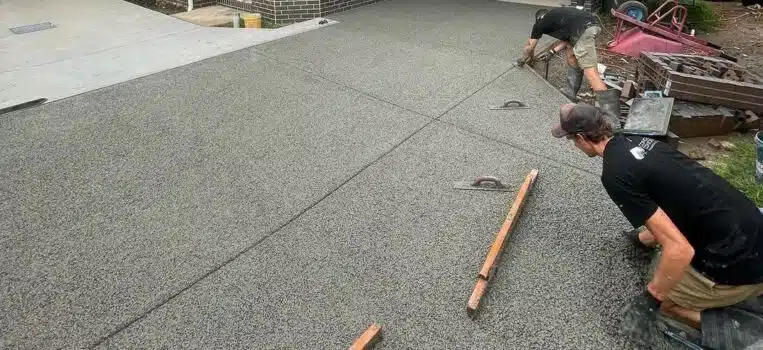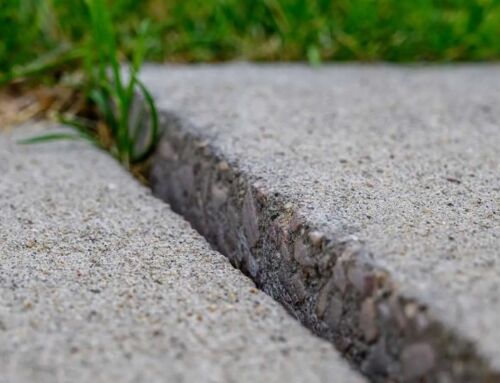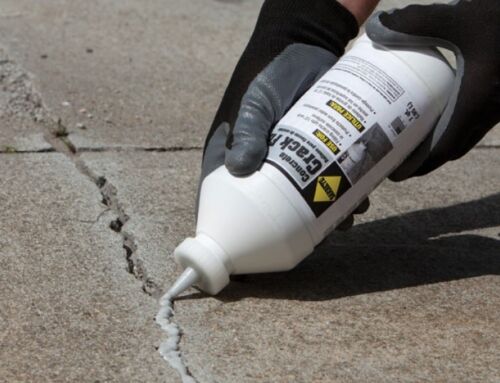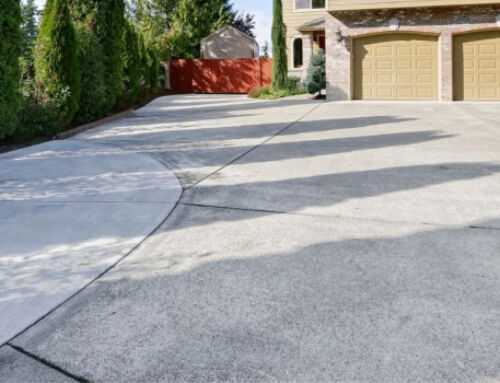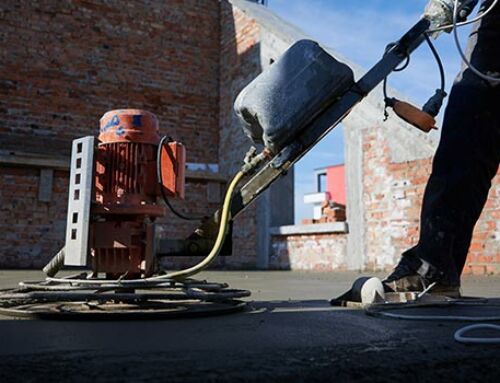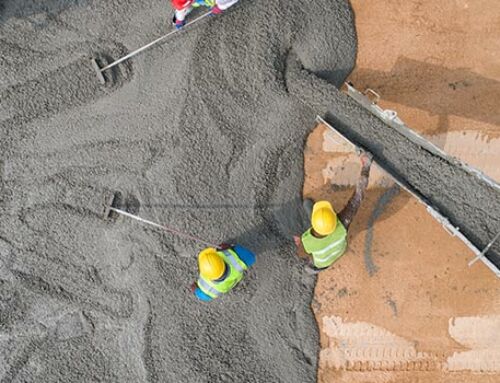The right option for your project might not be set in stone after checking out the differences between these two stellar surface materials.
Whether you’re deciding to upgrade a patio area or resurface an entire driveway, there are plenty of options to choose from. Concrete tends to be a popular option here in Melbourne because of the countless ways you can customise it to meet your needs. But one thing that concrete is not is porous. And if drainage is a question mark for you, then you might want to consider permeable paving instead.
When it comes to permeable paving vs. concrete, there are quite a few differences and factors to consider. While they’re similar in nature, they’re quite different in function, making them equally valuable but for different use cases. Let’s take a closer look at both materials and where one might be better suited than the other.
If you want to learn more about permeable paving, check out our other resources:
1. How Much Does Permeable Paving Cost?
2. How to Choose the Best Permeable Paving Contractor
A refresher course in permeable paving
If you’re checking out this article, then you’ve probably already had a primer on what permeable paving is. This material is a larger aggregate that’s mixed with a resin and then poured into place quite similarly to concrete. The key difference is that the large aggregate pieces create air pockets throughout the surface as it hardens, which allows not only air but also water to flow through the surface.
Permeable paving can be achieved in a solid pour installation or as pavers that are premade and installed in place for a more modern look. Either option is designed to help encourage proper drainage by allowing water to make its way through the surface and into the soil, rather than pooling on the surface and causing everything from annoying puddles to dangerous slip hazards.
Quick Tip: Here’s how you find Melbourne’s best permeable paving contractor
How concrete is different
We all know what concrete is, but how it differs from permeable paving is unique. Just like porous paving, concrete is made up of an aggregate (usually sand) and a resin (typically a cement paste) that hardens the mixture into an impervious surface. The emphasis here is on imperviousness. The aggregate in concrete is so small and fine that there is little, if any, space between the particles. As it dries and cures, the material hardens into a surface that simply won’t let water through.
Concrete is renowned for its versatility. In fact, it’s the second most used substance in the world, after water. This makes it extremely popular as a building material for everything from structures to highways and backyard patios and concrete driveways.
Permeable paving vs. concrete: Which should you choose?
One thing to keep in mind is that permeable concrete is just as strong and durable, if not more so, than its concrete counterpart. That’s because while porous surfaces let water through, concrete can crack or split over time if water pools on the surface. That said, both materials can withstand car traffic on a driveway and hold up to the seasonal use in your back garden or around your pool.
So, when it comes to permeable paving vs. concrete, which is the best? For the most part, it comes down to how essential drainage is to your use case. The main benefit to using permeable paving is that it helps with stormwater management. This material reduces runoff by allowing water to flow through it slowly and into the ground, rather than having it pool on the surface, pour into the streets, or flood your backyard into a soggy suburbia.
Permeable paving is also great around pool areas for this reason. Water splashed out of the pool will not stick around to create hazardous puddles that someone could slip and fall in. What’s more, it draws the moisture away from the foundation of the pool and into the groundwater system.
If stormwater management is not a priority, you might want to go with concrete instead. For one, it tends to be much cheaper than permeable paving because of lower installation and material costs. Another benefit to traditional concrete is how customizable it is. You can choose from a variety of different coloured concrete options as well as stamping, pave cutting, and design work that can make it a true piece of art that adds curb appeal.
Are these options even worth the effort?
Absolutely. Let’s say you’re exploring options for a new driveway. Both permeable and plain concrete can give you a solid surface that stands up to vehicle traffic with little to no maintenance needed. Other options, like gravel, stone, brick, and even shell can drive up the costs, require raking and replenishment, and require ongoing maintenance to keep them looking like new. Even asphalt requires regular maintenance with sealing every 3-5 years.
The same is true for patio and pool areas in a backyard, where durability and comfort are key. Both permeable paving and concrete can provide more comfortable, compatible surfaces for these areas at a lower price point than other traditional options such as stone, brick, or pavers. While permeable paving tends to be more expensive than plain concrete, both are more affordable than a lot of other options for driveways, walkways, and patios on the market.
Choosing the right kind of concrete for your concept
Permeable concrete is a real winner when it comes to areas that are regularly damp (like around pools) or that are notorious for poor drainage. This solution will help draw water away from the surface and down into the ground where it belongs. If you’re looking for a solid solution to your paving problems and stormwater drainage is not a concern, you can’t go wrong with plain concrete or accented impervious concrete in different colours and styles.
If you’re not sure which is right for you, don’t fear. The team at Concept Concrete can put together a quote that is designed just for you with the right materials, timeline, and cost. As a family-run business, we know how important it is to provide high quality, professional services at prices people can afford. As such, we’ve become Melbourne’s premier concrete provider and installer.
Get started with your project today by requesting a no-obligation quote for your space or calling 1300 366 343. We’ll be happy to answer any questions you have and help you choose between permeable paving vs. concrete for your project.

